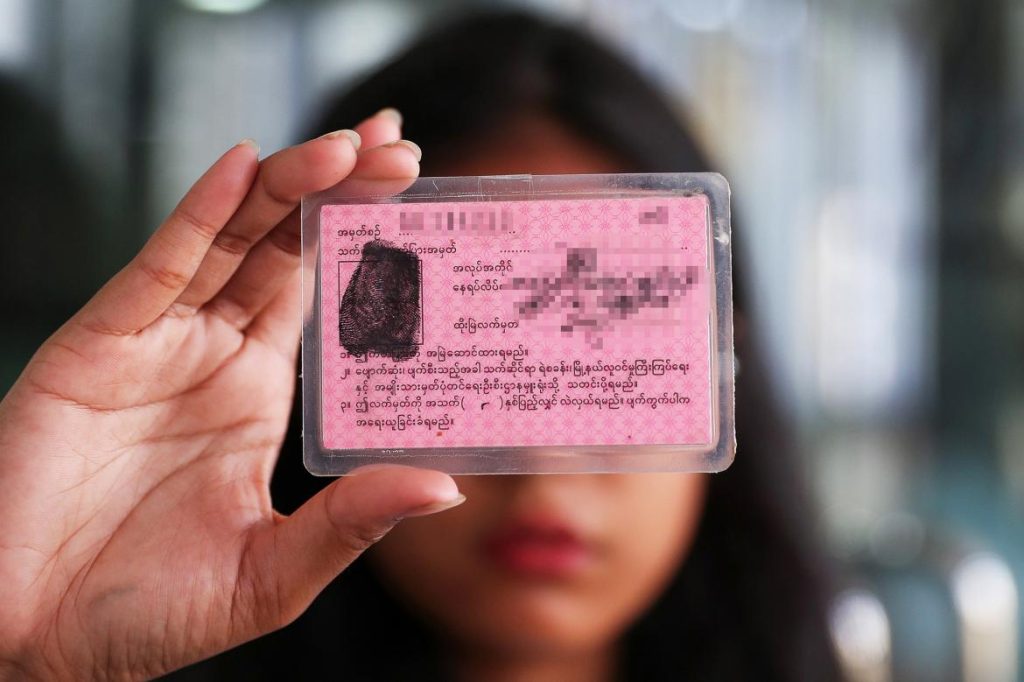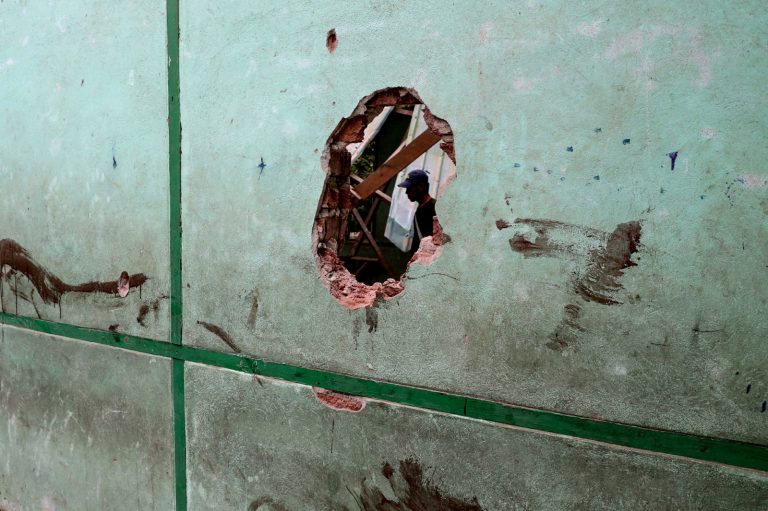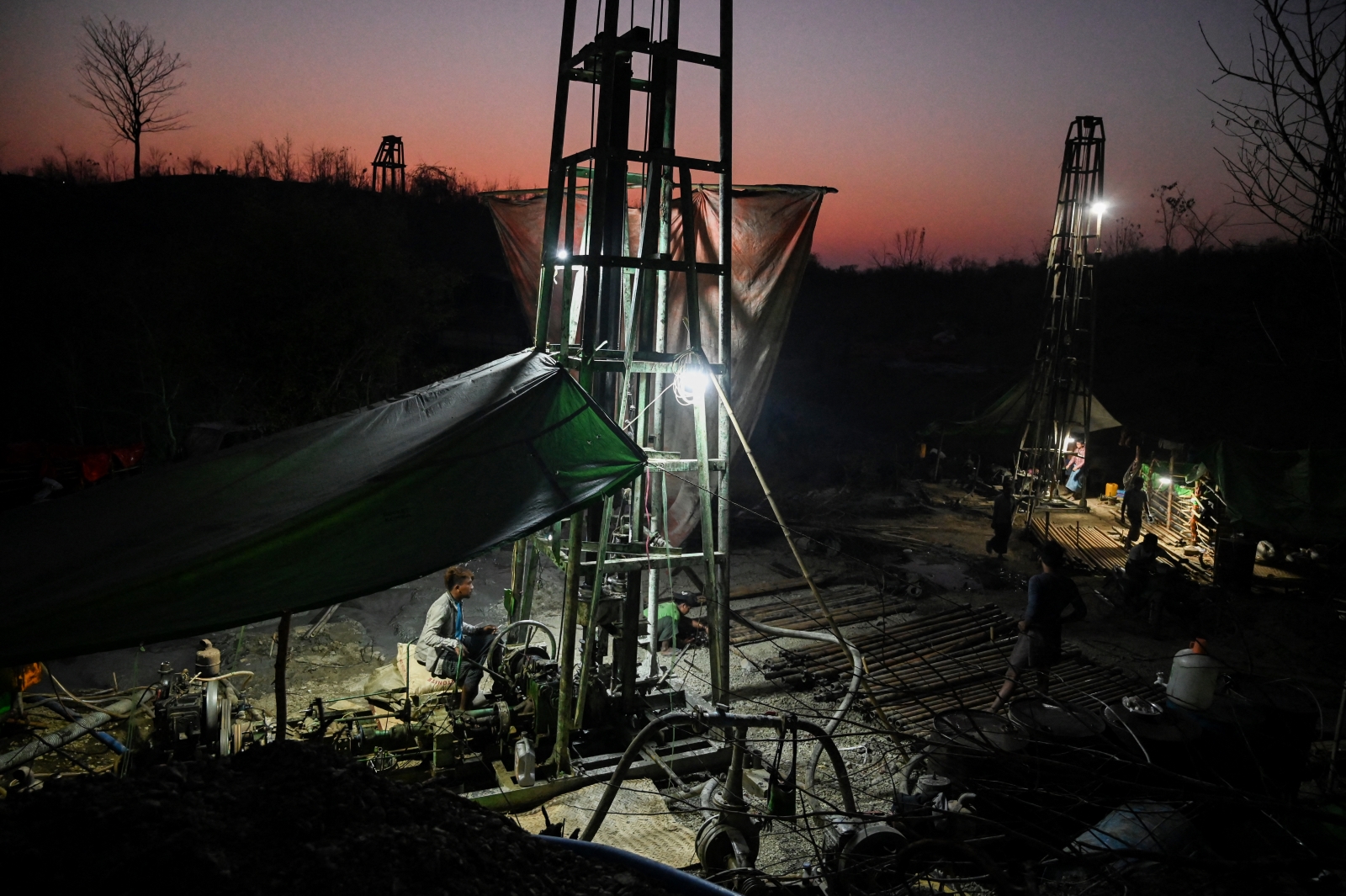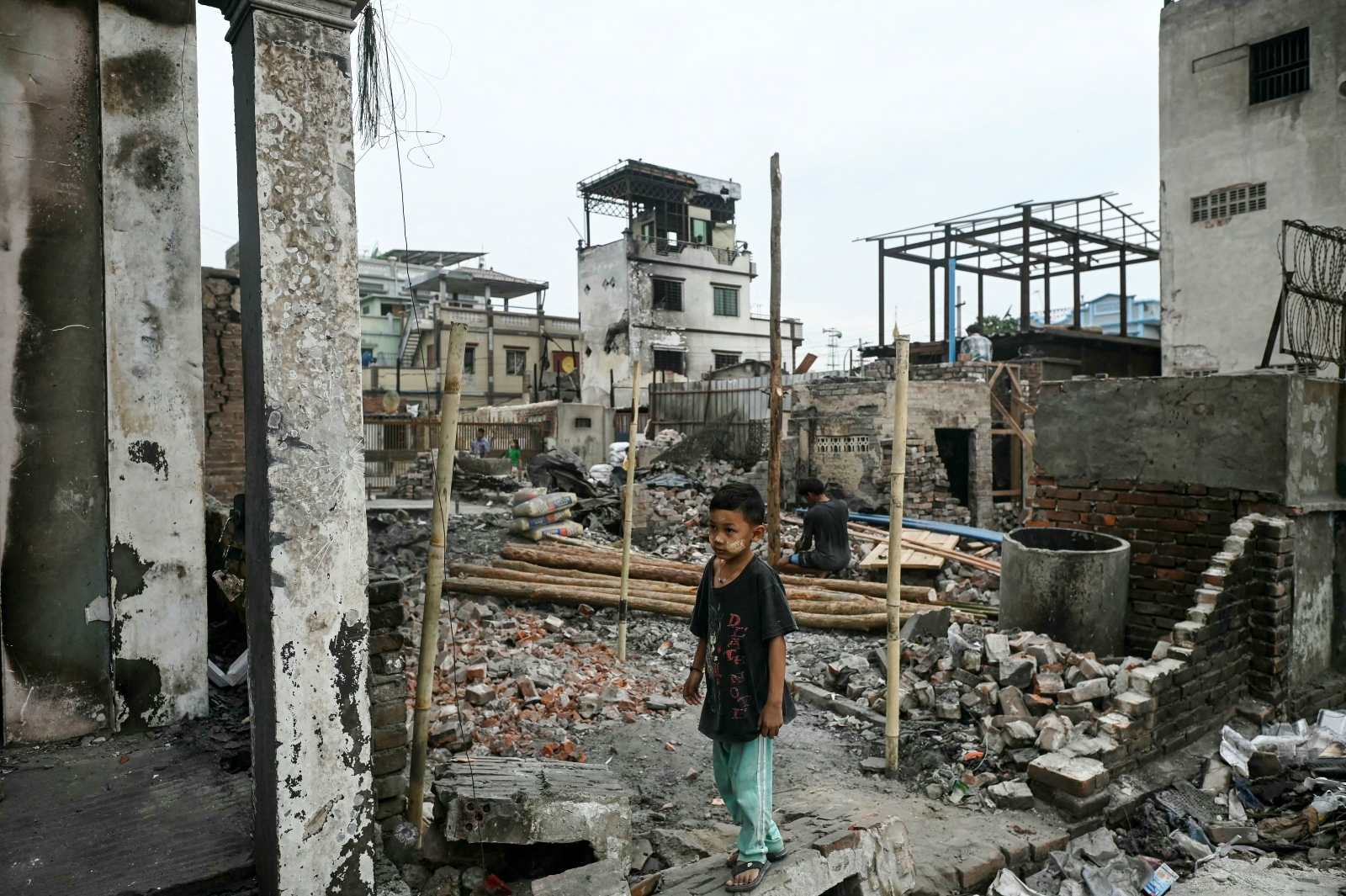An early pledge by the parallel National Unity Government to replace Myanmar’s racist citizenship law raised hopes for marginalised communities, but impatience is growing as revolutionary groups trade blame for the delays.
By FRONTIER
Ko Myat Thu has never forgotten the humiliation he felt when, aged 10, an immigration official pointed at him in front of his classmates and barked, “You are not the same as the others.”
The official was visiting Myat Thu’s school in Ayeyarwady Region’s Danubyu Township to hand out Citizenship Scrutiny Cards. The documents, popularly called National Registration Cards, are issued to people over 10 years old as a basic proof of identity and citizenship, and are required to travel, access government services and enter university and many professions.
But although Myat Thu was of age and had spent all his life in Myanmar, the official told him he was “not eligible” and summoned his parents to the township immigration office.
“Contrary to what she claimed, I was just the same as all the other children, except for just one difference – I’m a Muslim,” Myat Thu, now 30 and living abroad, told Frontier. “But after that I was treated as belonging to a lower class than my Bamar Buddhist friends.”
In the years that followed, Myat Thu’s parents made repeated visits to the township office and had to resort to bribing officials before he finally received his CSC at the age of 14. However, in the obligatory section of the card that states the bearer’s ethnicity, Myat Thu was marked as being mixed Pakistani and Bamar. His family has no connection with Pakistan besides the sole fact of being Muslim, so it felt like his religion had effectively turned him into an immigrant.
The same thing happened to his parents when they had to swap their old national ID cards for the newly introduced CSCs in the early 1990s.
“When my dad went to get his new ID card, he was asked to choose one of three: Pakistani, Indian, or Bengali. When my father protested that he was just a Bamar Muslim, the immigration officials changed his status to half Pakistani,” said Myat Thu.
The CSC was the first document to be issued under the 1982 Citizenship Law, enacted by the military dictator General Ne Win as part of his ultra-nationalist agenda. The law only granted automatic citizenship to members of official “national races”, such as the Bamar, Shan or Chin. Meanwhile it threw hurdles in the way of communities, particularly of Muslim faith, who were largely descended from Indian or Chinese settlers in the British colonial era, and who were targets of the early nationalist movement for independence.
Endemic corruption over decades has made it possible for families like Myat Thu’s to obtain CSCs, and therefore basic citizenship rights, in exchange for large bribes. However, people from non-recognised ethnic groups who lacked the money or connections were effectively made stateless – most famously the Muslim Rohingya community in Rakhine State. Many Rohingya had citizenship documents under previous laws, but their post-1982 status allowed them to be cast as foreign interlopers and expelled from the country in repeated bouts of brutal violence.
The law has remained on the books and continues to marginalise entire communities. Members of these communities and rights activists have therefore campaigned to repeal the 1982 Citizenship Law as a key element of the Spring Revolution, the nationwide uprising that has sought to overturn the military’s 2021 coup and create a federal democracy.
They were initially hopeful that the parallel National Unity Government, formed by elected lawmakers ousted by the coup, would devise a more inclusive model of citizenship, even if implementation awaited the defeat of the junta. But more than four years since the NUG’s founding, activists fear it is backing away from citizenship reform, echoing the failure of the National League for Democracy to use its majority in parliament before the coup to change the 1982 law.
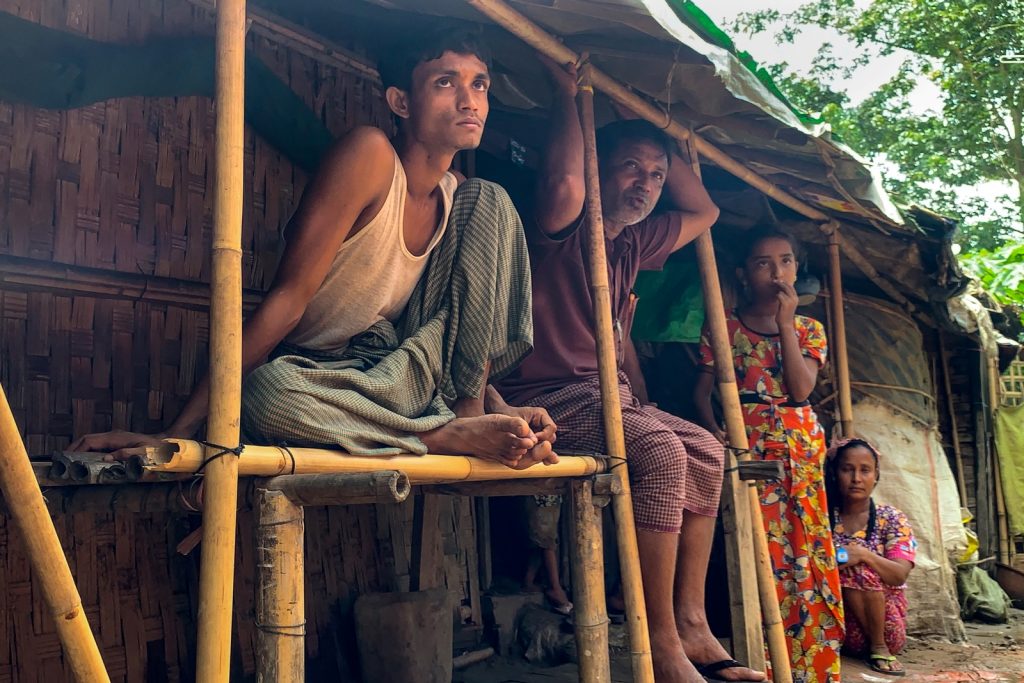
Early promise
The initial signs were positive when, in June 2021, the NUG published its Policy Position on the Rohingya in Rakhine State.
The policy statement recognised “the violence and gross human rights violations inflicted upon Rohingyas by the thuggish military” – in contrast to the pre-coup NLD government’s defence of the military’s actions against the community – and pledged to pursue justice for these crimes and to help repatriate Rohingya refugees languishing in Bangladesh when conditions allow. It also vowed to replace the 1982 law with one that bases “citizenship on birth in Myanmar or birth anywhere as a child of Myanmar citizens”, rather than on ethnicity. Yet, the statement said this would only happen after a new constitution is drafted, while seeking the views of all communities in the country.
Since then, however, the writing of a new constitution has foundered and rarely features anymore in public discourse. Moreover the NUG’s legislative arm, the Committee Representing Pyidaungsu Hluttaw, has not gone ahead and repealed the 1982 law – despite revoking and amending other statutes in the absence of a new constitution. It did this using powers granted by the Federal Democracy Charter, a document created after the coup to define basic rules and principles for the anti-junta struggle.
The second People’s Assembly of the National Unity Consultative Council, a policy-making and advisory body to the NUG, determined in April last year that the 1982 law should be abolished. However, CRPH spokesman U Sithu Maung said his organisation has not been able to act because the NUCC had failed to provide guidance on how the law should be repealed and replaced. “The failure here is the NUCC’s,” he said.
Yet, the NUCC, which includes the CRPH as a member, has been deadlocked over the last few years and struggles to deliberate anything.
Ko Aung Bhone Maw, member of the Yangon Students’ Union and the General Strike Collaboration Committee that is part of the NUCC, said the advisory body has become inactive partly because important member organisations including the CRPH are declining to participate. “Now I heard that they are having difficulty even holding regular meetings,” he said.
Sithu Maung said the CRPH remained a member but was not attending regular NUCC meetings, and was also absent from the concluding sessions of last year’s People’s Assembly because of what he called “disagreements”.
Sithu Maung said the CRPH found in its own review that more than half the articles of the 1982 law needed amending, making it more practical to enact a whole new citizenship act. However, the body lacks the mandate to do so single handedly.
A minority rights activist, now based in Thailand, said Myanmar could just revert to the 1948 Union Citizenship Act, which he described as “fairer” than the 1982 law because it allows citizenship not just based on ethnicity but also through residence. “If we update some articles in the 1948 law, we can use it,” he said.
U Aung Kyaw Moe, deputy minister for human rights and the only Rohingya in the NUG cabinet, said that despite appearances, progress was being made on addressing the law.
“In the coming months I will present a final abolition plan at cabinet meetings and I hope we will get a decision,” he said. “It won’t be long because we are at the final stage. Personally I would like to cancel the law as soon as possible. But to repeal a law is a matter for our entire government, so I can’t set a date by myself.”
Yet, minority rights activists say results can’t come soon enough. U Kyaw Win, spokesperson of the Muslims of Myanmar Multi-ethnic Consultative Committee, accused the NUG and related groups of playing politics by making false promises to the international community. The NLD’s pre-coup record on the Rohingya and the issue of citizenship had eroded overseas support for Myanmar’s democracy movement, so there was a need for grand gestures to win back support.
Kyaw Win pointed to the other laws passed or repealed since the coup, which showed the purported stumbling blocks on the citizenship law were “just an excuse”. “We’ve seen that the NUG and the CRPH aren’t honest, and we don’t believe them,” he said.
“They are throwing words at the international community to suggest they are working on the issue, but in reality they aren’t,” he added. “If they keep on like this then they will lose their reputation and the trust of the whole world. Promises should be kept. Political leaders should speak carefully.”
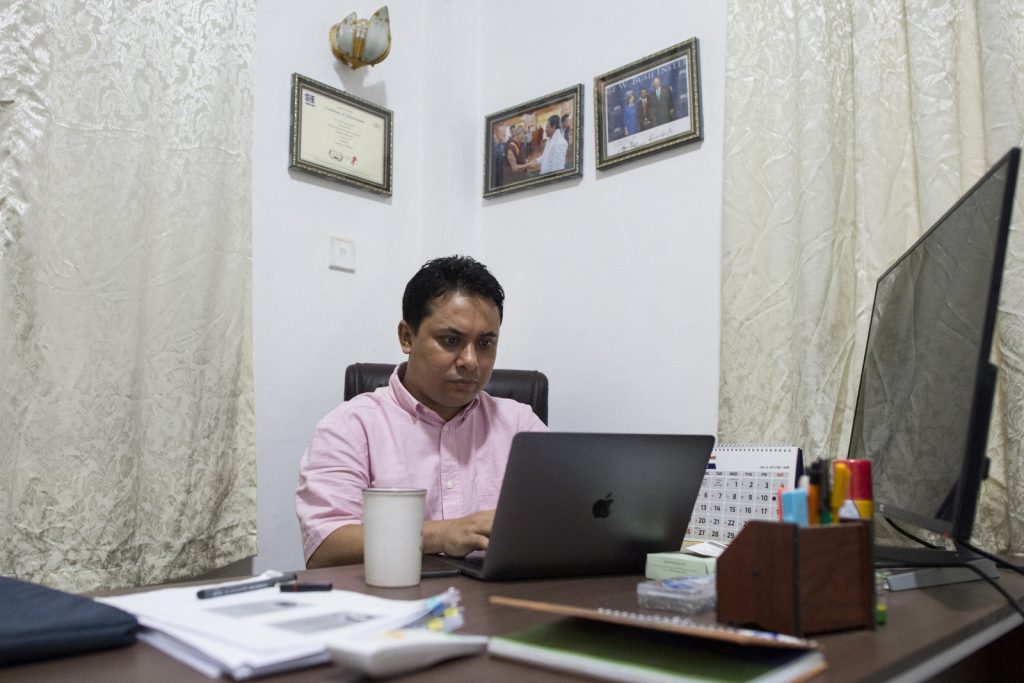
Fearing backlash
Ne Win’s regime started drafting the 1982 Citizenship Law after Operation Dragon King, a crackdown on so-called illegal migrants in Rakhine in 1978 that forced over 200,000 Rohingya to flee to Bangladesh.
Purportedly based on public consultations, the law created three tiers of citizenship – full, “associate” and “naturalised”. It also made membership of one of the national races, defined as communities who settled in the country before the British colonial period began in 1824, the primary basis of citizenship. The law also stated that those who were already citizens according to the previous 1948 law would retain their citizenship, but that was not respected in many cases.
Although the list was not included in the law, the post-1988 military regime that succeeded Ne Win used a roster of 135 national races to enforce it. The exact origin of this list has been widely disputed and its categorisation of ethnic groups is rife with errors, but it explicitly excluded people of Indian, Chinese and Nepali descent who were covered by the previous citizenship act.
Kyaw Win of the MMMCC said Myanmar needed to discard this conflation of ethnicity with citizenship. “For example there are Kachin people in both Myanmar and China … Not everyone who is in [a recognised] ethnic group can become a citizen, and not everyone who is a citizen is part of such an ethnic group. These two things cannot be mixed,” he said.
Yet, the conflation is deeply rooted in Myanmar. Thanks to decades of nationalist propaganda, many people still believe native groups need protection from those they regard as predatory settlers, including the Rohingya. Critics say that, ultimately, the NUG and related bodies are reluctant to touch the citizenship law because they fear a public backlash.
NUG Acting President Duwa Lashi La seemed to acknowledge this concern in a January interview with Al Jazeera, by saying it would take time to get the public on board. “It is not something we can rush. If we amend a law without deliberate consultation, it would be a weak law that would need to be amended again and again. We would not have the public’s trust in such weak laws. We must take time to create a law that the people have full faith and strong belief in,” he said.
The acting president also appeared to reiterate what was said in the NUG’s 2021 statement on the Rohingya, that repeal of the law would await the “transitional” era. This generally refers to the time after the junta is defeated and a new, transitional constitution is in effect. This era would also require a reconstituted, “transitional” NUG – as hinted by Lashi La’s comment that “the concerned government”, rather than his own administration, would be changing the law.
While some say they’re tired of hearing excuses, Aung Kyaw Moe told Frontier there was a real need to tread carefully regardless of when repeal happens. “The repeal process must be done in the correct manner,” he said, citing the importance of consulting all relevant groups and being mindful of public sensitivities.
Yet, despite his caution, Aung Kyaw Moe has often been attacked on social media and accused of only focusing on Rohingya rights, in a clear sign of how divisions and prejudices linger. He said he has “no feelings” about the hate speech directed at him. Instead he urges the public to understand democratic norms if they want to bring about democracy in Myanmar. “Abolishing this law is not for the benefit of one group of people,” he said, explaining that repeal is necessary to be “consistent with the democratic values of the whole country”.
The minority rights activist based in Thailand believes public opinion towards the Rohingya and other minorities has not changed significantly since the coup, despite popular narratives to the contrary, and that the issue demands intense advocacy.
“Leaders of the NUG and the CRPH should come out and speak out about this law in front of the public. Organisations like the General Strike Committee should also take a position and do advocacy,” he said. “But so far they are failing to do so.”
Kyaw Win said marginalised groups in Myanmar would never feel safe if revolutionary leaders fail to defy popular prejudices and make concrete reforms.
“Such a leadership that bends with every wind is very dangerous for us minorities,” he said. “If it’s like this then we must think hard about protecting ourselves. We won’t be able to trust any government that comes to power.”


